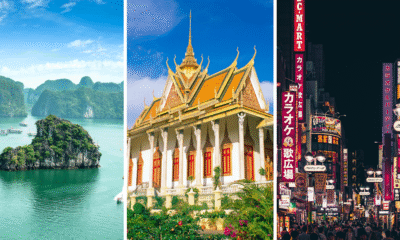Asia Travel Pulse
Not Vietnam or Thailand. At Rs 1,414 per day, another country is the cheapest travel destination in southeast Asia

Laos Tops the Affordability Chart
According to a recent Time Out magazine report, Laos stands out as the cheapest travel destination in Southeast Asia with an average daily expense of only £12 (around Rs 1,414). This modest budget covers accommodation, food, and transportation — allowing travelers to enjoy rich experiences without overspending.
This recognition aligns with a global ranking by Travel and Tour World, backed by research from the Canadian financial platform HelloSafe, which named Laos the world’s most budget-friendly country to visit in 2025.
What Makes Laos So Affordable?
Travel costs in Laos remain remarkably low across the board. Accommodation options such as hostel beds in popular tourist hubs like Luang Prabang and Vientiane can be found starting from £3 (Rs 353) per night, with even cheaper options in Vang Vieng at approximately £1.50 (Rs 176). Street food is widely accessible and inexpensive; a plate of sticky rice with grilled pork can cost less than £1 (Rs 117).
Local transport, including buses and minivans connecting major cities, is priced below £4.50 (Rs 529), while renting a motorbike for a day costs around £4.70 (Rs 553). The newly opened Laos–China Railway offers a scenic and affordable route between Vientiane and Vang Vieng at approximately £6 (Rs 706).
Entry fees for popular tourist sites are also budget-friendly. For instance, visiting Kuang Si Falls and the adjacent Bear Rescue Centre costs just about £2.30 (Rs 270), making sightseeing accessible to most travelers.
Quiet Destination with Growing Popularity
Laos is often described as a serene and less commercialized alternative to the busier tourist hotspots in the region. Its unhurried pace, natural beauty — including rivers, mountains, and waterfalls — and genuine cultural experiences appeal to travelers seeking something off the beaten path. According to the Vientiane Times, international arrivals in Laos increased by 11% in the first quarter of 2025 compared to the previous year, with over 1.2 million visitors generating $426 million in tourism revenue. Domestic tourism is also on the rise, with nearly double the local trips recorded in the same period.While Vietnam and Cambodia remain affordable with daily travel budgets around £15 (Rs 1,768), and Malaysia and Indonesia slightly higher at approximately £19 (Rs 2,239), Laos offers unmatched value at £12 per day. Thailand, traditionally known for its budget travel appeal, comes in at around £24 (Rs 2,829), making Laos notably cheaper.
Why Travelers Should Consider Laos in 2025
For budget-conscious travelers seeking authentic cultural immersion, Laos presents an ideal choice. It offers a combination of affordability, scenic landscapes, and warm hospitality that is increasingly rare as tourism expands across Southeast Asia. Whether exploring ancient temples, enjoying street food, or taking leisurely river rides on the Mekong, visitors can experience much more in Laos without stretching their budgets.
As international recognition grows, Laos remains a standout destination for those looking to maximize their travel experience while keeping costs low. For anyone planning a trip to Southeast Asia this year, Laos is worth serious consideration as the region’s most affordable and enriching travel option.
Asia Travel Pulse
Asia Pacific Dominates Growth in Premium Class Travel, Outpacing Economy in 2024

Published on
August 11, 2025 |
With changing priorities and a heightened appetite for luxury experiences, Asia Pacific is now leading the rebound in premium class travel. The International Air Transport Association’s 2024 World Air Transport Statistics report shows premium travel in the region business and first class expanded by 22.8% this year, overshadowing the 11.5% rise seen in the economy segment worldwide.
Such numbers reveal that upscale travel in Asia Pacific is bouncing back more swiftly than elsewhere. As corporate and leisure passengers worldwide gravitate toward more opulent and relaxing in-flight environments, carriers in the region report an unprecedented upswing in bookings for premium seating.
A Record Surge in Premium Class Travel
By the end of 2024, 116.9 million international travelers flew in premium cabins, accounting for 6% of all international passengers. While this expansion is remarkable in its own right, it is more striking when set beside the 11.5% increase in economy load factor. Asia Pacific drove the anomaly, with premium traffic climbing 22.8% and adding 21 million additional premium seats sold throughout the region.
In contrast to uneven rebounds still felt in North America and Europe, Asia Pacific airlines are enjoying consistent corporate and high-net-worth demand—both urgent and discretionary. Corporate travel is coming back with more travelers in first and business class cabins; affluent leisure and incentive groups are, in many cases, seeking chartered premium cabins. Asia’s leading airlines, well-prepared with refreshed fleets and focused lounges, are winning this share with seamless connections and cabins that increasingly blur the line between first class and private jets.
Corporate Traveler Insights: Premium Bookings at Record Levels
Corporate Traveler, the business travel services pioneer, announced today that premium cabin reservations for the September quarter reached their strongest figures in more than 12 months. Tickets in premium economy climbed 30% year-on-year, while business class traffic rose 9% for the same quarter.
The findings underscore a sustained preference among corporate road warriors for upgraded comfort and seamless service in the new travel normal. Companies and their employees are clearly willing often at their own expense to trade budget for a more relaxed and productive journey. Airlines, in response, have stepped up investment in premium cabins, confident that a richer, aspirational passenger experience will drive revenue, loyalty, and network performance in the region.
The Rise of Premium Economy: A Key Contributor to Growth
While the spotlight shines on business and first class, premium economy has quietly gathered traction. In 2024, bookings climbed 30 percent compared to the year before, as more fliers select the comfy middle ground. Carriers like Singapore Airlines, Cathay Pacific, and ANA are responding with wider seat pitch, upgraded meals, and priority boarding features that move the needle on comfort but still cost far less than business-class rates.
The data suggests consumers are now willing to pay a bit more for a thoughtful boost in travel quality, rejecting the slightest pinch of economy- class compromise. In a region that prizes value, premium economy neatly tallies the comfort gain against the financial outlay, positioning itself as the cornerstone of Asia Pacific’s expanding premium travel lane.
Global Trends: Asia Pacific Outpaces Europe, North America
Demand for premium cabins has risen across Asia Pacific, touching nearly every national carrier, not just a handful of major players. Chinese, Japanese, and Indian airlines alike are reporting fuller business and first-class cabins, which in turn is lifting total passenger numbers for the entire region.
Whereas Europe and North America now enjoy steady but modest growth in premium bookings, the Asia Pacific curve is sharper. Countries such as China and India are generating most of the region’s new wealth, and those new fortunes are reinforcing a taste for, and a readiness to pay for, high-end travel—be it business trips, family holidays, or a mix of both.
Routes to Watch: Top Busiest International Routes
The impact of this surge in premium passengers is also seen in the busiest international routes. Asia Pacific dominates the list, with Jeju-Seoul in South Korea topping the list of the world’s busiest routes. In 2024, 13.2 million passengers flew between the two cities, indicating a high level of demand for both economy and premium seats. Meanwhile, the Melbourne-Sydney route remains one of the most popular, consistently ranking in the top five busiest routes globally.
The rise of premium travel on these high-traffic routes underscores the growing appetite for luxury experiences, particularly in key markets such as Asia, which sees more travelers opting for premium cabins for short-haul as well as long-haul journeys.
The Role of Sustainable Travel and Infrastructure Investment
Carriers across the Asia Pacific are stepping up their sustainability efforts, rolling out new fleets powered by hybrid engines alongside carbon-offset initiatives designed to attract eco-minded luxury flyers. As wealthy consumers grow more vocal about their environmental values, the push for greener luxury travel is no longer optional; it’s expected.
Meanwhile, forward-looking investments in cutting-edge airport lounges, smart baggage systems, and lie-flat seats on ever-longer routes are encouraging more passengers to choose premium cabin itineraries whether on domestic hops or intercontinental journeys. The result is a consistently high standard of service that networks seamlessly across the entire journey, proving that luxury travel and sustainability are no longer at odds; in fact, they’re becoming the same product.
Looking Ahead: The Future of Premium Travel
Premium travel across Asia Pacific is poised for more strong growth. Carriers are already expanding their high-end offerings, while discerning travelers are prioritizing both comfort and overall value. The uptick in premium economy sales shows this is more than a momentary trend: it’s a fundamental change in travel preferences, merging indulgence and cost-effectiveness.
Looking ahead, expanding affluent populations and the ongoing rise of Asia’s leading airlines will keep this momentum strong. For those who seek elevated comfort on the move, Asia Pacific is fast becoming the preferred launch pad for premium travel.
Asia Travel Pulse
Serena Hotels launches global Prestige Club app across Africa and Asia

Serena Hotels has officially launched the Prestige Club App, a digital loyalty platform that connects 33 properties across Africa and Asia, offering a unified guest experience and cross-border rewards. The simultaneous launch across key city hotels: Kenya, Uganda, Tanzania, Rwanda, Mozambique, and Pakistan marks the brand’s first global rollout of a tech-enabled membership programme.
The app introduces a consolidated system for earning and redeeming points across Serena’s entire portfolio, covering not only stays but also dining outlets and Maisha Spa & Health Clubs. It is structured around four membership tiers, Classic, Gold, Platinum, and Prestige Plus, with features including real-time point tracking, mobile access, and region-wide recognition.
“The Prestige Club is designed to serve today’s regional and international traveller. Our aim is to offer guests a consistent and rewarding experience whether they are travelling for business in Nairobi, on retreat in Swat, or visiting cultural landmarks in northern Pakistan,” said Aziz Boolani, Global CEO of Serena Hotels.
The launch comes at a time when cross-regional travel is recovering steadily. By offering a single loyalty ecosystem across two continents, Serena Hotels aims to simplify travel and create new pathways for guests from South Africa, India, China, and neighbouring markets.
Designed for regional and international travellers, the app reflects guest feedback and evolving travel trends, aiming to simplify travel and offer personalised experiences. Ashish Sharma, CEO Serena Hotels – Africa, said, “At Serena Hotels, loyalty is something we hold in the highest regard. For over 50 years, you, our guests, have chosen us to be part of your most meaningful moments. From business travels to weekend escapes, from celebrations to family getaways, you have made us part of your story. And tonight, it’s our turn to write a new chapter, with you at the center of it.”
Speaking on the milestone, he added, “We are delighted to launch the Serena Prestige Club App, our most ambitious leap forward in loyalty to date. This is not just a digital upgrade; it’s a complete transformation of how we recognize, reward, and engage with our guests. From paper to palm. From country-specific rewards to borderless experiences. From a points programme to a dynamic, tiered system that grows with you. It is loyalty made smarter, more accessible, and more rewarding. It ensures that every Serena guest, wherever they are globally, feels recognized, valued, and empowered to explore our 33 iconic destinations across 8 countries.”
The network includes heritage palaces, restored forts, and mountain resorts in Asia, such as Khaplu Palace & Residence, Shigar Fort Residence, and Hunza Serena Inn, alongside coastal retreats, city hotels, and safari lodges in Africa. The loyalty programme applies equally across the portfolio, allowing guests to access consistent benefits regardless of location.
Key Highlights of the Prestige Club App
Global Recognition: One digital platform, two continents. Members enjoy elite privileges across 33 Serena Hotels destinations in Africa and Asia.
Multi-Tiered Access: A structured programme with Classic to Prestige Plus tiers, offering room upgrades, dining benefits, wellness access, and more.
Mobile-First Experience: App-based account management with booking, redemption, and service requests available in-app.
Inclusive of Lifestyle and Leisure: Points can be redeemed on experiences such as safari excursions, spa treatments, cultural dining, and mountain retreats.
The app was developed based on guest feedback and changing travel trends, including an increasing demand for regional experiences and personalised rewards. It complements Serena’s long-standing emphasis on cultural heritage and locally anchored hospitality across its properties.
The Prestige Club App is now available for download on iOS and Android platforms and is open to both frequent guests and first-time visitors looking to explore the Serena network.
Asia Travel Pulse
Pacific Asia Travel Association Youth Symposium 2025 to Take Center Stage at Srinakharinwirot University in Bangkok, Providing Valuable Industry Insights and Networking Opportunities

Published on
August 11, 2025 |
The Pacific Asia Travel Association (PATA) Youth Symposium 2025 is set to take center stage at Srinakharinwirot University in Bangkok, offering a dynamic platform for young professionals and students in the travel and tourism industry. This prestigious event aims to provide valuable insights into the latest industry trends, fostering meaningful networking opportunities with key stakeholders. As the tourism sector continues to evolve, the symposium will play a crucial role in shaping the future of travel, offering attendees a chance to engage with experts, share innovative ideas, and explore potential career paths within this fast-paced and ever-growing field.
The Pacific Asia Travel Association (PATA) will host the PATA Youth Symposium 2025 at Srinakharinwirot University in Bangkok, Thailand, on Monday, August 25, just ahead of PATA Travel Mart 2025. The event is being graciously supported by the International College for Sustainability Studies, Srinakharinwirot University (SWUIC), in partnership with Bangkok University International (BUI).
This engaging symposium will feature dynamic panel discussions, motivating student-led conversations, and valuable networking opportunities with industry experts from across the Asia Pacific region. It aims to provide young professionals with the essential skills and insights needed to thrive in the rapidly changing tourism sector.
“Empowering youth is not just an investment in their future, it is an investment in the future of the tourism industry. Together, as an industry, we must build the bridges that lead them from aspiration to achievement.” stated PATA CEO Noor Ahmad Hamid. “It is one of PATA’s proudest works to guide the new generation of tourism professionals, both those who have only begun their journey and those who are excelling towards their goals, and ensure that they are ready to overcome obstacles and seize the opportunities once they join the workforce.
He continued, “PATA is, of course, grateful to our host, the International College for Sustainability Studies, Srinakharinwirot University, and all participating organisations for joining us in supporting the rising stars of our industry. Without them, this event would not be possible.”
Thanakorn Thongprayoon, Dean of the International College for Sustainability Studies, Srinakharinwirot University, commented: “SWUIC is truly honoured to host this inspiring and forward-looking event. The PATA Youth Symposium 2025 aligns closely with our mission to foster globally minded graduates who are not only career-ready, but also committed to creating a sustainable and inclusive future for the tourism industry. We believe in the power of youth, and by connecting them with industry leaders, we can ignite new ideas and drive meaningful change in our shared future.”
SWUIC is honored to host the PATA Youth Symposium 2025 and is eager to welcome all participants to its campus. The institution is dedicated to fostering the development of global citizens, instilling a profound understanding of sustainability and diversity while equipping students with the knowledge and skills needed for success in today’s world. This event provides the perfect environment to explore career opportunities in the travel and tourism sector and to analyze emerging industry trends.
Program Highlights
The symposium will kick off on August 25 with two motivating keynote speakers: Sophia Montgomery, a Physics student at Harvard University and a Paris 2024 Olympian in Women’s Dinghy Sailing, alongside Jonathan Low, CEO of Global Success Learning Academy.
Following the keynote addresses, the event will feature an engaging panel discussion with graduates who have successfully entered the tourism workforce. Participants will have the chance to engage in this interactive exchange, where experience meets ambition.
Additionally, the symposium will present two more panel sessions focused on practical career insights. The first, “Uncovering the Unseen: Discovering Hidden Careers in Tourism,” will feature experts from the Thailand Incentive and Convention Association (TICA), Intrepid Travel, and iSanook Hotels & Resorts, who will shed light on niche careers within the tourism industry that students may not have considered before. The second session, “Career-Ready: How to Impress Recruiters,” will include human resource professionals from Dusit International and other top companies, who will offer valuable advice on how to effectively prepare for the job market.
The Pacific Asia Travel Association (PATA) Youth Symposium 2025 will take place at Srinakharinwirot University in Bangkok, offering valuable insights and networking opportunities for young professionals in the travel industry. This event will focus on emerging trends and future career paths, helping attendees connect with industry leaders and peers.
The day will conclude with a workshop hosted by the PATA Thailand SWUIC Student Chapter in collaboration with the PATA Thailand Bangkok University Student Chapter.
-

 Brand Stories3 weeks ago
Brand Stories3 weeks agoBloom Hotels: A Modern Vision of Hospitality Redefining Travel
-

 Brand Stories2 weeks ago
Brand Stories2 weeks agoCheQin.ai sets a new standard for hotel booking with its AI capabilities: empowering travellers to bargain, choose the best, and book with clarity.
-

 Destinations & Things To Do3 weeks ago
Destinations & Things To Do3 weeks agoUntouched Destinations: Stunning Hidden Gems You Must Visit
-

 Destinations & Things To Do2 weeks ago
Destinations & Things To Do2 weeks agoThis Hidden Beach in India Glows at Night-But Only in One Secret Season
-

 AI in Travel3 weeks ago
AI in Travel3 weeks agoAI Travel Revolution: Must-Have Guide to the Best Experience
-

 Brand Stories1 month ago
Brand Stories1 month agoVoice AI Startup ElevenLabs Plans to Add Hubs Around the World
-

 Brand Stories1 month ago
Brand Stories1 month agoHow Elon Musk’s rogue Grok chatbot became a cautionary AI tale
-

 Brand Stories3 weeks ago
Brand Stories3 weeks agoContactless Hospitality: Why Remote Management Technology Is Key to Seamless Guest Experiences
-

 Asia Travel Pulse1 month ago
Asia Travel Pulse1 month agoLooking For Adventure In Asia? Here Are 7 Epic Destinations You Need To Experience At Least Once – Zee News
-

 Brand Stories1 month ago
Brand Stories1 month agoChatGPT — the last of the great romantics













You must be logged in to post a comment Login